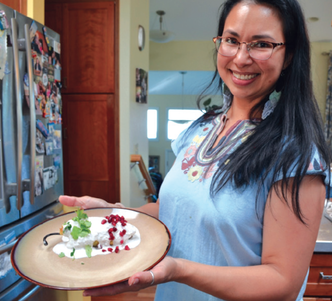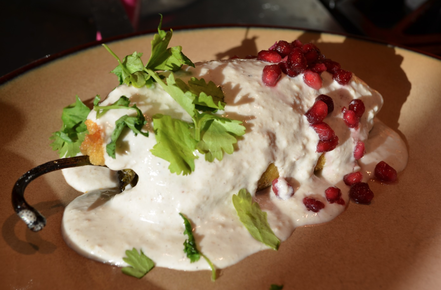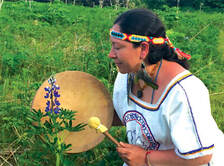IndiGenous recipes
by ITZEL ZAGAL & CAROLINA VIDAL
On this occasion I have the pleasure of introducing Carolina Vidal who, in addition to cooking delicious, is also a successful and creative entrepreneur (The Piñata Shop). Carolina shares with us the recipe for the traditional Chiles en Nogada, substituting the beef or pork for bear meat. This recipe is an example of how native Alaskan ingredients can be very well incorporated into a typical Latin American recipe.
The traditional "chiles en nogada" are prepared in Mexico from mid-July to the end of September, being one of the most representative dishes and relished during the celebration of the national holidays. Although a time consuming dish to prepare, the result is so worth your invested time that you’ll wish you could eat this more often; its aromatic and the unusual ingredients make for the perfect marriage between sweet and savory. Originally created in the southern State of Puebla Mexico by Augustine nuns, this dish is prepared a little bit different in many states in Mexico: with walnuts or pecans, goat cheese or cream cheese, nutmeg or cinnamon, parsley or cilantro and so on. As any homemaker would do, we adjust and work with the ingredients we have on hand specially when living away from our country of origin, yet taking advantage of the local ingredients we get to harvest. Alaska is a very generous state and this time of year many families get to fill their freezers with game meats and whatever else they got from fishing or forage. We’ve been blessed with bear meat this particular year, and so I decided to give this traditional recipe an Alaskan twist, I was not disappointed with the results! TIP: You can save some time by preparing the first 4 steps ahead of time (getting the Poblano peppers ready); they can be stored in the fridge for a few days before the actual day you’ll get to enjoy them. Serves 6 people INGREDIENTES:
PREPARATION:1. Turn on oven broiler on high (if broiler is not available, this step can be done on stove burner), place a baking tray on bottom rack to catch juice drops from peppers.
2. Wash, pat dry and place Poblano peppers on top rack of oven, about 6 inches away from broiler, skin will blister all around them, make sure to turn them every 10 mins or so. 3. Place peppers inside a plastic bag for 10 minutes, this will create steam which will help separating skin from peppers when peeling. Using disposable gloves carefully peel with a butter knife, or your fingers, the burnt skin from peppers and cut an opening lengthwise without cutting all the way to the tip, remove seed pod and visible veins (skip removing veins if you like your peppers hot!). Set your peppers aside. 4. Heat up a large skillet over medium heat, once hot toast pine nuts and raisins, stirring constantly so they don’t burn. Place them on a plate once they get brown enough. Add 2 Tbsp olive oil and sauté the diced plantain, set aside along with pine nuts and raisins. 5. Add the remaining 2 Tbsp of olive oil to skillet and sauté onion and garlic until they have softened, add the ground bear meat and season with salt, pepper, and cinnamon. Verify seasoning once the meat is cooked. Pour the tomato sauce and cook for about 5 more minutes. 6. Add the plantain, apple, peach, candied citron, pine nuts and raisins, stir them well with the meat, cover the skillet and let it cook on low heat for 15 mins. Adjust the seasoning if needed. 7. Meanwhile, prepare the cream: add all ingredients into a blender or food processor and blend on high for couple minutes. Set aside. 8. Fill up the peppers making sure not to stuff them too much so you can close them up with a couple of toothpicks for easier handling. (if you must avoid eggs, you don’t need to close the peppers with toothpicks and can continue to step 11). 9. To prepare the egg batter beat the three egg whites on medium to high speed until fluffy consistency, then add one yolk at the time fully mixing in with the egg whites, lastly sprinkle the flour and beat well. (It’s important to do this step when you are ready to fry your peppers as the batter will get flat if you let it sit too long). 10. In a small saucepan heat up the cooking oil over low to medium heat, about 1 inch deep. Carefully dip each pepper into the egg batter and fry in hot oil, turning the peppers so they get cooked all around, working on batches and making sure the oil doesn’t get too hot and smoky. Place peppers in a plate lined with paper towels to absorb excess oil. 11. Serve the peppers on a plate, pour the nogada cream over them and sprinkle the cilantro and pomegranate seeds to your taste; the traditional way of doing it is by sprinkling the cilantro on one end of the pepper, leaving the center white and sprinkling the pomegranate seeds towards the other end- just like the Mexican flag. Enjoy! NOTE: If the peppers are too hot for the children, you can serve the meat with a side of white rice and a glass of horchata.
Itzel Zagal writes bilingual poetry, and short stories on issues related to migration, decolonization, gender, among others. She has published poems in Sol de Medianoche, Antología Muñecas, Cirque Journal, Antología Grito de Mujer, and Alaska Women Speak. She was nominated to the Pushcart Prize 2019 by Cirque Journal. She holds an LL.M. in International Human Rights Law and loves Aztec dance.
|


